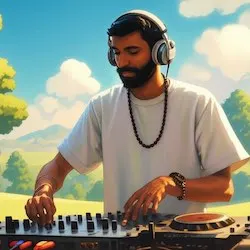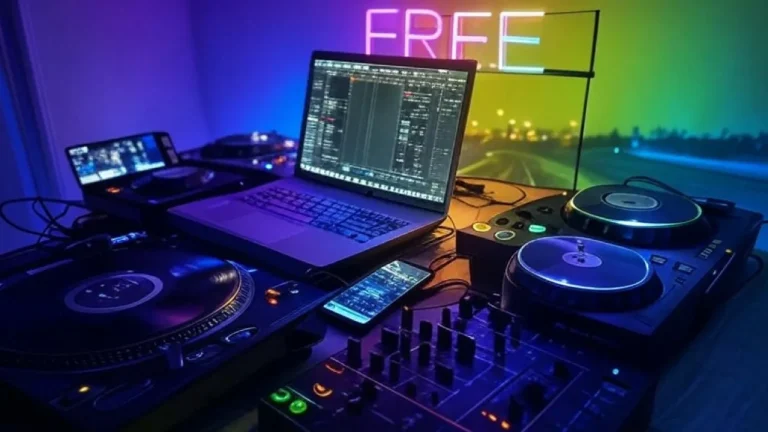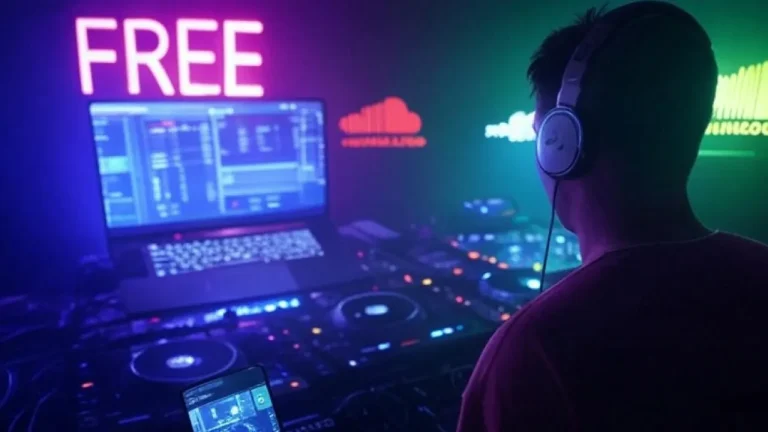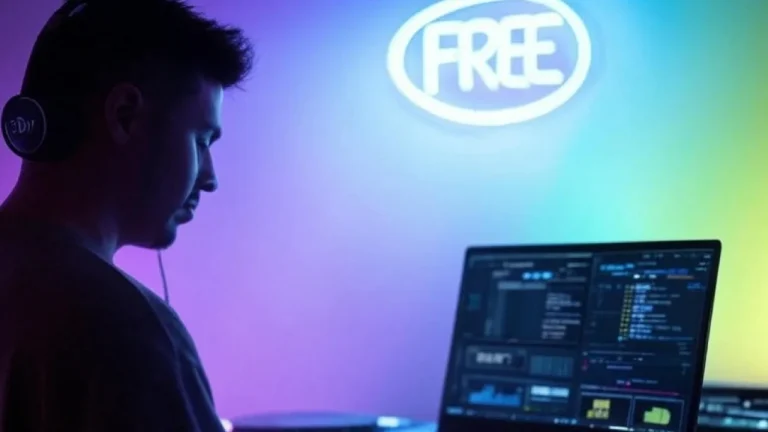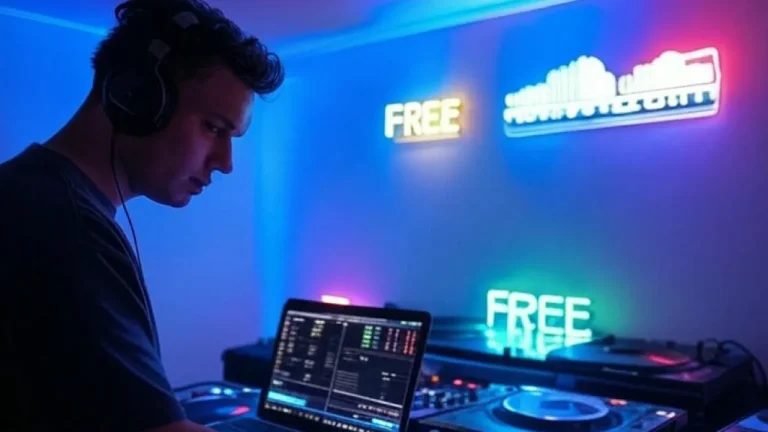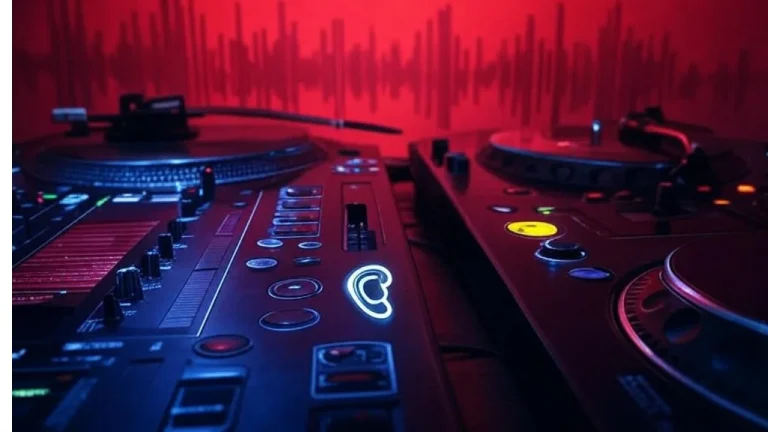You can create your first DJ set for under $15 using only free DJ software and legal music downloads. I built my debut 30-minute set spending zero dollars on programs while mixing tracks from Jamendo and SoundCloud. After 12 years spinning records from basement parties to paid club gigs, I started exactly where you stand now: broke, excited, and hungry to mix.
The DJ industry pushes expensive gear hard. Controllers, mixers, turntables costing hundreds or thousands. Ignore that noise. My first 50 practice sessions happened on a 2016 laptop with $12 headphones. Those sessions taught me beatmatching, phrasing, and energy flow better than any expensive equipment could. Start cheap, build skills, upgrade later when you know what you actually need.
Free DJ Software for Absolute Beginners
Mixxx runs completely free on any laptop from the past decade with zero hidden costs or upgrade pressure. I installed Mixxx on my old Dell with 4GB RAM and mixed my first 100 sets without spending a penny. The software handles beatmatching, key detection, effects, and four-deck mixing better than software costing $300.
Serato DJ Lite gives you the industry-standard interface professionals use. The lite version costs nothing and includes two-deck mixing, practice mode, and stems isolation. When you plug in a compatible controller later, Serato automatically activates extra features. Both programs crush the myth that quality DJing requires expensive tools.
| Software Name | Price Point | Platform Support | Core Features |
|---|---|---|---|
| Mixxx | $0 forever | Windows, Mac, Linux | 4 decks, auto BPM detection, vinyl control, broadcasting |
| Serato DJ Lite | $0 (practice mode) | Windows, Mac | 2 decks, practice mode, cue points, pitch control |
| VirtualDJ Home | $0 (non-commercial) | Windows, Mac | Video mixing, sampler, automation, stems |
| djay Free | $0 (basic version) | iOS, Android | 2 decks, streaming integration, automix |
Installing and Configuring Your Free DJ Software
Download Mixxx from mixxx.org in under two minutes. Run the installer. Launch the program. Point Mixxx at your music folder through Library > Add Folder. The software analyzes every track for BPM, key, and waveform data automatically. My 200-track collection took 8 minutes to analyze on a slow laptop.
Configure your audio output in Preferences > Sound Hardware. Set Master output to your speakers or Bluetooth device. Headphones output goes to your headphone jack or USB audio interface. Adjust the crossfader curve from Sharp to Smooth for gentler transitions between tracks. Disable Master Sync temporarily to force yourself to learn manual beatmatching first.
For Serato DJ Lite, create a free account at serato.com. Download the installer for your operating system. After installation, activate Practice Mode from the Setup screen. This unlocks mixing without hardware controllers. Load tracks on the virtual decks by dragging from your library. The interface displays dual waveforms, BPM counters, and pitch faders clearly.
Finding Free Music for DJ Sets Legally
Jamendo offers 600,000+ Creative Commons licensed tracks that you can legally download and play in DJ sets without copyright strikes or licensing fees. I sourced my first 80 tracks entirely from Jamendo, building a house and techno collection that cost nothing. Each track displays its specific Creative Commons license type before download.
Legal Free Music Platforms I Actually Use
SoundCloud hosts millions of tracks from bedroom producers releasing free downloads. Search your preferred genre (house, techno, drum and bass, hip-hop). Filter results to show only tracks with download enabled. Click the download arrow below the waveform. Most downloads come as 320kbps MP3 or WAV files suitable for professional mixing.
Free Music Archive curates royalty-free tracks across 16 main categories and 200+ sub-genres. Every track includes clear licensing information. No registration required to download. I pulled 40 downtempo and chill tracks from FMA for warm-up sets without paying a dollar. Bandcamp features thousands of artists offering “name your price” releases with $0 minimum. Support independent musicians while building your library affordably.
| Music Source | Total Tracks | Download Quality | Commercial Use |
|---|---|---|---|
| Jamendo | 600,000+ | MP3 320kbps, WAV | Yes (with CC BY license) |
| SoundCloud | 300 million+ | Varies (128-320 kbps) | Depends on artist |
| Free Music Archive | 1 million+ | MP3, FLAC | Check individual licenses |
| Bandcamp (free) | 50,000+ | MP3, FLAC, WAV | Artist discretion |
Understanding Creative Commons Licensing
Creative Commons BY allows you to use tracks commercially with artist attribution. Play these at paid gigs legally by crediting the artist. Creative Commons BY-NC permits non-commercial use only like practice sessions and free parties. Creative Commons BY-SA requires you to share derivative works (like recorded mixes) under the same license. Creative Commons BY-ND prohibits remixing or altering the original track.
Read each track’s license before downloading. I keep a spreadsheet tracking which songs allow commercial performance. Takes 30 seconds per track and prevents legal headaches later. When uploading recorded mixes, always include tracklists with proper artist credits in the description.
Manual Beatmatching Without Auto-Sync
Learning manual beatmatching before using auto-sync builds transferable skills that work on any equipment in any situation. I disabled sync completely for my first month practicing. That discipline forced me to develop my musical ear. Now I can beatmatch on club CDJs, vinyl turntables, or broken equipment where sync fails.
Step-by-Step Beatmatching Process
Load track one on deck A and press play through your speakers. Cue track two on deck B in your headphones only. Tap your foot to track one’s beat: 1-2-3-4, 1-2-3-4. Listen to track two’s tempo. Count its kick drums. Compare the two speeds mentally. If track two feels faster, move the pitch slider down by 1% to slow it down. Too slow? Push the pitch slider up.
When both tracks feel close in tempo, press play on track two while keeping it in your headphones. Listen to both kick drums simultaneously. They should hit at the same time. If track two drifts ahead, lightly tap the jog wheel backwards to slow it briefly. Drifting behind? Push the jog wheel forwards. Small corrections keep tracks aligned during the transition.
Pitch Slider Precision Techniques
Start with tracks in the same BPM range (like 124 to 126). Large tempo differences frustrate beginners. Use coarse adjustments first: move the pitch slider in 1-2% increments to get roughly aligned. Then apply fine-tuning: adjust by 0.1-0.2% for perfect synchronization. Watch the BPM counters but trust your ears primarily. Visual displays help confirm what you hear.
Practice the jogwheel touch technique daily. Rest one finger lightly on the side of the jogwheel edge. Apply gentle backwards pressure to slow the track slightly. Push forward to speed it up momentarily. Micro-adjustments during transitions keep beats locked tight. I spent 15 minutes daily for two weeks just touching jogwheels until the muscle memory solidified.
EQ Mixing and Frequency Management
Cutting bass frequencies when blending tracks prevents muddy, clashing low-end that kills dancefloor energy. I learned this after my first disastrous practice session where two basslines fought each other into sonic mud. Drop the incoming track’s low EQ to zero. Slowly raise it over 16-32 beats while simultaneously lowering the outgoing track’s bass. Clean swap, powerful impact.
Three-Band EQ Control Strategy
Low frequencies (bass): Control kick drums, sub-bass, and bottom-end power. Keep only one track’s bass at full volume during transitions. Clash occurs when both tracks play full bass simultaneously. Mid frequencies: Handle vocals, synths, and melodic elements. Boost mids by +2 to +4dB to make vocals or leads cut through the mix. High frequencies: Manage hi-hats, cymbals, and treble sparkle. Keep highs bright on the incoming track for excitement and energy.
My standard EQ transition pattern: incoming track starts with highs at 12 o’clock (neutral), mids at 12 o’clock, lows at 7 o’clock (zero). Over 16 beats, I gradually raise lows from 7 o’clock to 12 o’clock while dropping the outgoing track’s lows from 12 o’clock to 7 o’clock. At the 16-beat mark, perform the full swap. Smooth frequency exchange, professional sound.
Filter Sweeps for Creative Transitions
High-pass filters remove bass and mids, leaving only treble. Sweep the filter knob from 12 o’clock (neutral) to full right (maximum filter) over 8 beats. The outgoing track loses body gradually, creating space for the incoming track. Low-pass filters eliminate treble and mids, leaving only bass. Use these for dramatic tension-building before drops.
Combine filter sweeps with EQ kills for power moves. I filter out the outgoing track’s highs over 4 beats while simultaneously killing its bass. This creates a brief moment of only mid frequencies. Then I slam the incoming track’s full-frequency spectrum in hard. The contrast generates excitement and crowd reaction.
Building Your First 20-Minute DJ Set
Select 10-12 tracks in identical or closely related genres with BPM variance under 6 to simplify your first complete set. I used all house music between 124-128 BPM when starting. The narrow genre and tempo focus let me concentrate on transition quality rather than fighting mismatched styles. Master consistency before adding variety.
Set Structure and Energy Flow Design
Opening sequence (tracks 1-3): Begin with low-energy, groove-focused tracks. Minimal vocals, simple drum patterns, warm pads. Set the vibe without overwhelming. I start at 123-124 BPM with deep house or minimal techno. Energy builds gradually, not explosively. Build-up phase (tracks 4-6): Increase intensity step-by-step. Add tracks with stronger basslines, more complex percussion, building synth patterns. Tempo can rise to 126-127 BPM here.
Peak section (tracks 7-8): Drop your most powerful, energetic, crowd-moving tracks. Maximum bass, dramatic breakdowns, memorable hooks. This segment defines your set’s emotional climax. I save my absolute best track for position 7, not position 1. Cool-down finale (tracks 9-12): Gradually decrease energy and complexity. Return to simpler grooves, warmer sounds, reflective moods. End on a positive, memorable note that leaves audiences satisfied.
Creating a Practice Playlist
Make a dedicated playlist titled “First Set Practice” in your DJ software. Drag your 10-12 selected tracks into this playlist. Arrange them in your planned performance order. Play through the complete sequence without stopping. Time yourself. My first complete run-through took 24 minutes with rough transitions. After ten practice sessions, the same set ran 19 minutes with smooth blends.
Record every practice attempt. I use Mixxx’s built-in recording function (activated via the broadcast preferences). Listen back within 24 hours while the session remains fresh in memory. Note which transitions felt awkward. Identify energy flow problems. Hear phrasing mistakes you missed during performance. Recorded playback reveals more than live mixing ever does.
Harmonic Mixing Using Key Detection
Tracks in compatible musical keys blend melodically without clashing notes when overlapped during transitions. Both Mixxx and Serato detect key automatically for every track. I organize my library by key tags (8A, 5B, 12A) to quickly find harmonically compatible songs. Mixing within the same key or one step away on the Camelot Wheel creates professional-sounding, musical transitions.
Camelot Wheel Navigation
The Camelot system assigns each musical key a number (1-12) plus a letter (A for minor keys, B for major keys). Songs in 6A work perfectly with other 6A tracks. Move to 5A or 7A for energy shifts while maintaining harmonic compatibility. Jump from 6A to 6B (relative major) for mood changes that still sound natural. Avoid large jumps like 1A to 10B unless creating intentional jarring effects.
| Current Track Key | Compatible Next Keys | Transition Effect |
|---|---|---|
| 8A (A minor) | 8A, 8B, 7A, 9A | Smooth, natural flow |
| 8A (A minor) | 8B (C major) | Mood lift (minor to major) |
| 8A (A minor) | 9A (E minor) | Energy increase |
| 8A (A minor) | 7A (D minor) | Energy decrease |
When to Ignore Harmonic Mixing Rules
Drum-focused genres like minimal techno or percussion-heavy tribal house care less about key compatibility. Tracks without strong melodic elements can be mixed regardless of key. I mix drum and bass tracks purely by energy and rhythm, ignoring key entirely. Breakdowns and outros provide safe mixing points even between incompatible keys because melodic elements drop out.
Trust your ears over theory. If two tracks in “incompatible” keys sound good together, play them together. The Camelot Wheel guides decisions but doesn’t dictate absolute rules. I’ve mixed 3A into 9B because the specific tracks worked despite theoretical incompatibility. Your musical judgment matters more than rigid theory adherence.
Budget-Friendly DJ Equipment Under $30
A Behringer UCA202 USB audio interface costs $25 and enables proper DJ headphone cueing by splitting your computer’s output into separate channels. One channel routes to headphones for previewing the next track. The other channel sends to speakers for the live mix. I used this exact device for eight months before upgrading to a controller with built-in audio routing.
Minimal Budget Equipment List
Computer: Any laptop or desktop from the past 10 years with 4GB+ RAM handles DJ software smoothly. My 2015 Lenovo with an Intel i3 processor runs Mixxx without hiccups. Headphones: $15-25 models from Panasonic, Sony, or Koss work fine for practice. Look for closed-back designs that block external noise. Avoid open-back studio headphones that leak sound.
USB audio interface: Behringer UCA202 ($25) or Behringer UCG102 ($30) split audio for DJ cueing. Both feature RCA outputs for speakers and headphone outputs. No driver installation needed on modern operating systems. Speakers: Reuse computer speakers, Bluetooth speakers, or bookshelf speakers you already own. Spend $0 here initially. Upgrade to studio monitors later when earning from paid gigs.
DIY Audio Splitting Without Extra Hardware
Some laptops include dual headphone jacks or combined audio ports. Check your computer’s specifications. Certain motherboards support independent audio streams through software configuration. Windows users can explore Voicemeeter Banana (free software) for internal audio routing. Mac users can try Soundflower (discontinued but still functional) or BlackHole (modern alternative).
The smartphone method: Connect your phone via Bluetooth to speakers for the main mix. Use your laptop’s headphone jack for cueing. Mix one track on the laptop, one track on the phone. Sync them by manually timing the drops. Clunky workflow but costs literally nothing if you own both devices already.
Phone DJing With Mobile Apps
Algoriddim’s djay app runs free on iOS and Android, transforming your smartphone into a portable two-deck mixer. I tested djay on an iPhone 10 with streaming integration from Apple Music. The touch interface responds quickly. Tempo sliders adjust smoothly. Basic EQ and effects include reverb, echo, and filters. Perfect for practice sessions anywhere without hauling a laptop.
Setting Up Mobile DJ Apps
Download djay from your device’s app store. Grant permission to access your music library. The app scans and analyzes all tracks for BPM and key automatically. Connect to Spotify, Apple Music, or TIDAL for streaming access (subscription required for these services). Load tracks on the virtual turntables by dragging from the library browser.
Enable split output mode in Settings > Audio. This routes the master mix to speakers while sending headphone cue to your headphone jack. Connect a Bluetooth speaker or use your phone’s built-in speaker for casual practice. The free version includes ads and limited recording. I practiced 5-10 minute sets daily during commute time using just my phone and earbuds.
Phone DJ App Limitations
Small screen size makes precise waveform editing difficult. Touchscreen jogwheels lack the tactile feedback of physical wheels. Battery drain runs high when mixing continuously for 30+ minutes. Audio quality depends on your phone’s DAC and amplifier quality. Streaming services require active internet connection and premium subscriptions.
Phone apps shine for portability and spontaneous practice sessions. Not suitable for professional performances or serious skill development. I used djay for three months during work breaks to reinforce timing and phrasing concepts. Complemented my main laptop practice sessions effectively without replacing them.
Daily Practice Routine for Fast Improvement
Fifteen minutes of focused practice daily outperforms three-hour weekend marathon sessions because consistent repetition builds muscle memory faster than sporadic effort. I practiced every morning before work for 30 days straight. My beatmatching accuracy jumped from 60% success rate to 95% in that month. Short, frequent sessions beat long, irregular ones every time.
Four-Week Beginner Training Program
Week 1 focus: Beatmatching fundamentals. Practice aligning two tracks by ear without looking at BPM displays. Set a timer for 15 minutes. Mix the same two tracks repeatedly until transitions feel effortless. Ignore everything except tempo matching. Week 2 focus: Adding EQ control. Continue beatmatching practice but now incorporate bass swapping. Drop incoming track’s lows while raising outgoing track’s lows. Practice this exchange until smooth.
Week 3 focus: Building mini-sets. Chain three tracks together in sequence. Practice the complete three-track mini-set 5 times daily. Record your best attempt. Listen back and identify weak points. Week 4 focus: Complete set performance. Mix 8-10 tracks start to finish. Record the entire set. Share with experienced DJs for feedback. Refine based on criticism received.
15-Minute Daily Practice Structure
Minutes 1-5: Warm-up with beatmatching random track pairs. Choose tracks blindly without checking BPM first. Force your ears to do the work. Minutes 6-10: Technique drill focused on one specific skill.
Monday: EQ mixing.
Tuesday: Harmonic mixing.
Wednesday: Phrasing and transitions.
Thursday: Filter effects.
Friday: Complete mini-set.
Minutes 11-15: Cool-down mixing for fun. Play tracks you love without overthinking technique. Rebuild enthusiasm and excitement for the craft.
Common Beginner DJ Mistakes to Avoid
Mixing out of phrase creates awkward transitions where musical sections clash instead of flowing naturally. Electronic music follows 8, 16, or 32-beat phrase structures. Drops, breakdowns, and builds happen at phrase boundaries. I started mixing at random moments during my first week. Tracks crashed into each other horribly. Learning to count phrases fixed this immediately.
Phrasing and Beat Counting
Count kick drum beats out loud: 1-2-3-4, 2-2-3-4, 3-2-3-4, 4-2-3-4 (this equals 16 beats total). Most house and techno tracks change every 16 or 32 beats. Start your transition at the beginning of a 16 or 32-beat phrase. End the crossfader swap at the next phrase boundary. The incoming track’s drop aligns with the outgoing track’s breakdown. Musical sections mesh perfectly.
Set cue points at phrase markers in your DJ software. Mixxx and Serato let you save multiple cue points per track. I place cues at: intro end, first drop, breakdown start, second drop, outro start. These markers guide my mixing points during performance. Takes 2 minutes per track during library prep but saves hours of awkward mixing later.
Volume and Gain Staging Errors
Playing both tracks at full volume simultaneously muddies the mix and causes listener fatigue. Lower the outgoing track’s volume as you raise the incoming track’s volume. The total combined volume should remain roughly constant. I watch my master level meter. It should stay in the green zone (around -6dB to -3dB) without hitting red (distortion territory).
Gain knobs adjust each track’s input level before it hits the mixer. Set gains so all tracks play at roughly equal loudness. Prevents huge volume jumps when switching between songs. I calibrate gain by playing each track solo and adjusting until the level meter shows consistent height across my entire library.
Recording and Sharing Your Practice Sets
Mixxx includes free built-in recording that captures your entire mix as WAV or MP3 files without installing extra software. I record every single practice session to document progress and catch mistakes. Click the broadcast preferences in Mixxx. Enable recording. Choose MP3 format at 320kbps bitrate. Hit record before starting your set. Mixxx saves the file automatically when you stop recording.
Recording Quality Settings
MP3 at 320kbps provides excellent quality with reasonable file sizes (roughly 1MB per minute). WAV format offers uncompressed audio but creates massive files (10MB per minute). I use 320kbps MP3 for practice recordings and WAV for sets I plan to share publicly. Normalize your recording volume in post-production using free software like Audacity if the mix sounds too quiet.
Name your files systematically: “2025-01-22_House_Practice_Set_15min.mp3” includes date, genre, type, and length. Helps you track progress chronologically. I keep all practice recordings in a dedicated folder organized by month. Reviewing old recordings from months ago reveals how much your skills improve over time.
Uploading Mixes to Sharing Platforms
Mixcloud handles DJ mix copyright better than YouTube or SoundCloud through licensing agreements with rights holders. Upload your recorded set to Mixcloud with a complete tracklist. The platform pays royalties to artists based on play counts. SoundCloud allows mixes but frequently removes them for copyright claims. I lost three early mixes to SoundCloud takedowns before switching to Mixcloud exclusively.
Include detailed tracklists in your upload descriptions. List every song with artist name, track title, and timestamp. Tag your mix with accurate genres. Add a short written description explaining your creative approach or set concept. I gained 200 followers in six months by posting monthly mixes consistently with detailed metadata.
Upgrading to Budget DJ Controllers
Numark Party Mix sells for $80 and includes built-in light show, touch-sensitive jog wheels, and Serato DJ Lite compatibility making it the best ultra-budget controller option currently available. I recommend waiting 2-3 months before buying any controller. Master software-only mixing first. That patience ensures you know exactly which controller features you actually need versus marketing hype.
Controllers by Price Tier
Under $100: Numark Party Mix ($80) delivers surprising value with built-in LED light show, two channels, and portable form factor. Pioneer DDJ-200 ($99) offers smartphone compatibility and rekordbox integration in a compact package. Both work well for bedroom practice but feel flimsy for regular transport. $100-200: Pioneer DDJ-FLX4 ($180) provides the best introduction to Pioneer’s ecosystem with rekordbox and Serato support. Numark Mixtrack Pro FX ($150) adds jog wheel displays and paddle FX controls for creative mixing.
$200-350: Numark Mixtrack Platinum FX ($280) includes four-deck control, high-resolution jog displays, and professional I/O. Pioneer DDJ-400 ($250) mimics club-standard layout perfectly, teaching skills directly transferable to CDJ setups. Native Instruments Traktor Kontrol S2 ($300) targets electronic music producers with tight DAW integration and remix deck features.
| Controller Model | Street Price | Key Features | Best For |
|---|---|---|---|
| Numark Party Mix | $80 | Light show, 2 channels, ultra-portable | Absolute beginners on tight budgets |
| Pioneer DDJ-FLX4 | $180 | Dual software support, USB-C, iPad compatible | Users wanting Pioneer quality cheap |
| Numark Mixtrack Pro FX | $150 | Jog displays, paddle FX, long pitch faders | Feature-hungry budget shoppers |
| Pioneer DDJ-400 | $250 | Club layout, rekordbox, tutorial mode | Club DJ aspirants |
When to Actually Buy a Controller
Wait until you can confidently mix 5 tracks in sequence without major errors. I practiced software-only for three months before purchasing my first controller. That delay forced skill development without hardware assistance. When I finally got a controller, the physical layout felt immediately familiar because I understood the concepts already.
Buy used controllers from local sellers to save 30-50% off retail prices. Check Facebook Marketplace, Craigslist, or DJ forums for secondhand gear. Test all functions before purchasing: jogwheels, faders, knobs, buttons, and USB connection. I bought my second controller used for $120 (50% off retail) and it worked flawlessly for two years of heavy use.
Joining Online DJ Communities
Reddit’s r/Beatmatch community has 180,000+ members sharing advice, feedback, and troubleshooting help specifically focused on beginner and intermediate DJs. I posted my first recorded mix there and received detailed feedback from five experienced DJs within 24 hours. That criticism identified three specific technical weaknesses I didn’t notice myself. Community feedback accelerates learning dramatically.
Active DJ Learning Communities
Reddit r/Beatmatch: Post mixes for feedback, ask technical questions, read daily discussion threads. The community maintains strict rules against self-promotion, keeping content focused on learning. Reddit r/DJs: More experienced crowd discussing advanced techniques, gear reviews, and industry topics. Less beginner-friendly but valuable for progression. Facebook DJ groups: Search for local scene groups in your city plus genre-specific communities. I’m in “Deep House DJs Worldwide” with 25,000 members sharing track recommendations and mixing tips.
Discord servers: Digital DJ Tips runs an active server with voice channels for live practice sessions. DJ TechTools hosts competitions and technique challenges. These real-time interactions build connections faster than forum posts. Join Y2mate for structured DJ courses, tutorials, and learning paths designed specifically for budget-conscious beginners. The platform helped me understand harmonic mixing and energy flow concepts through clear visual demonstrations.
Getting Valuable Feedback on Your Mixes
Ask specific questions instead of generic “rate my mix” requests. Bad question: “What do you think of my set?” Good question: “My transition at 8:45 sounds muddy. How can I clean up the bass frequencies better?” Specific inquiries generate actionable answers. Generic requests get ignored or receive useless “sounds good bro” responses that teach nothing.
Return feedback to others regularly. I review two beginner mixes weekly and provide detailed timestamped critique. This practice sharpens my critical listening skills while building community goodwill. People remember helpful commenters and reciprocate with thoughtful feedback when you need it.
Next Steps After Mastering Your First Set
Perfect your initial 15-20 minute set by performing it 15 times. Each iteration should sound tighter than the previous attempt. I played my debut set 20 times over two weeks until every transition felt automatic. Then I built set number two using completely different tracks and a faster BPM range. Created five distinct 20-minute sets before attempting my first full 60-minute mix.
Experiment with effects after solidifying your fundamentals. Reverb adds space and depth. Echo creates rhythmic repetition. Filters build tension and drama. I waited two months before touching effects. That patience paid off because my transitions already sounded professional before adding complexity. Effects enhance good mixing. They never fix bad mixing.
Booking Your First Unpaid Gigs
House parties offer the perfect low-pressure first performance environment. Tell friends you DJ. Offer to play their next gathering for free. I played my first “gig” at a birthday party for 30 people. Nobody cared about minor mistakes. The forgiving atmosphere built confidence without paralyzing performance anxiety.
Small bars and coffee shops sometimes book DJs for background music sets. Approach venue managers with a recorded mix demonstrating your style. Emphasize reliability and professionalism over fame or experience. I landed a monthly coffee shop residency by showing consistent preparation and punctuality during my trial performance.
Free Learning Resources I Still Use
YouTube channels Crossfader, Digital DJ Tips, Club Ready DJ School, and DJ Carlo Atendido offer hundreds of free tutorials covering every technique imaginable. I watched one 10-15 minute video daily during breakfast for my first three months learning. Those tutorials taught phrasing, harmonic mixing, scratching basics, and genre-specific tricks my software manual never mentioned.
Recommended YouTube Channels by Skill Level
Pure beginners: Club Ready DJ School breaks down basic concepts into digestible chunks with clear demonstrations. Crossfader focuses on transition techniques and mix structure. Intermediate learners: DJ TechTools explores advanced controller mapping, effects usage, and workflow optimization. Ellaskins The DJ covers mobile DJing and streaming service integration. Advanced techniques: Laidback Luke and other pro DJs occasionally post tutorials revealing professional-level tricks rarely discussed elsewhere.
Podcast listening: Download DJ mixes from your favorite artists. Study their track selection, transition timing, and energy management. I analyzed 50+ Carl Cox and Adam Beyer sets during commutes, taking mental notes on phrasing choices and build patterns. Passive listening trains your musical ear between active practice sessions.
Frequently Asked Questions
Yes, both Mixxx and Serato DJ Lite work with just a laptop and basic headphones using practice mode. I mixed my first 100 sets using only my laptop keyboard for controls. The keyboard spacebar pauses/plays tracks, arrow keys adjust pitch, and number keys trigger cue points. Not ideal for live performances but perfect for learning beatmatching, phrasing, and set structure at home.
Two weeks of daily 15-minute practice teaches functional beatmatching skills. I could align two tracks smoothly after 14 consecutive days of focused practice. Building a complete set takes an additional two to three weeks. Expect competent bedroom DJ skills after accumulating 25-30 total practice hours spread over one to two months. Performing live confidently requires three to six months of consistent practice.
$0 using only Mixxx software, free Jamendo music downloads, and headphones you already own. I literally spent zero dollars during my first two months learning. Added a $25 USB audio interface in month three for better cueing. Total startup cost stayed under $30 while building skills equivalent to people spending $500 on controllers plus subscriptions.
No, DJing requires rhythm awareness and musical intuition, not formal music theory or sheet music reading. I never studied traditional music theory. Instead, I developed my ear by actively listening to track structures, counting beats, and recognizing phrase patterns. Those practical skills matter infinitely more than knowing scales, chords, or notation.
House music at 120-128 BPM works best for beginners because tracks feature consistent four-on-the-floor kick patterns and clear 16-beat phrase structures. I started exclusively with deep house and progressive house. The straightforward rhythms simplified beatmatching dramatically. Avoid dubstep, drum and bass, or breakbeat initially due to complex timing, frequent tempo changes, and syncopated rhythms.
Pack 12-15 tracks for a 30-minute set assuming average three-minute song lengths with overlapping transitions. I use exactly 14 tracks for my standard 30-minute sets. Some transitions blend for 45 seconds, others for two minutes. The buffer prevents awkward silence if transitions run longer than expected. Better to have extras than run short mid-performance.
Learn manual beatmatching exclusively for your first month, then use auto-sync if desired. I disabled sync completely for 30 days. That discipline forced ear training and manual skills transferable to any equipment worldwide. Auto-sync helps during stressful live performances but manual ability saves you when technology fails or equipment lacks sync functionality.
Private house parties generally allow copyrighted music without licensing in most jurisdictions. Public venues, festivals, or events charging admission require performance rights licenses through ASCAP, BMI, or SESAC. I play commercial tracks at friend gatherings but use Creative Commons music exclusively for paid public gigs when starting out. Check your local copyright laws for specific regional requirements.

